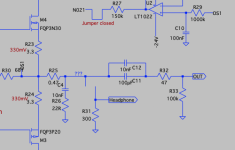Will do, and I will report back.I believe the current mirrors and the feedback resistor control the gain. So double-check the resistor values R13 and R14, and R27.
I did not try that, yet.Did you zero the offset with the OPAMP out of the circuit? (There's a jumper for that in the later schematic; in the earlier one you have to remove the OPAMP from its socket.). If the circuit is out-of-balance and the OPAMP is working hard to bring the offset back down, that might affect the gain? (I'm not sure here.)
Been using PS Audio's Directstream DAC MK1 - according to their specs:What's the voltage of your input signal? (If you're using something like Roon you might have the volume attenuated on the software side.)
1.414 VRMS (Single Ended)
I have tested with another amp, and it was VERY loud fast. HPA-1 Clone could not get loud with HD600 even at max volume 🙁
Jeff, I am sorry to hear about it. Fingers crossed you'll be as good as new shortly after the surgery!!! 🙏(Major caveat: I go in for open-heart surgery next week, so I'm scatter-brained as all hell. Take everything with a grain of salt....)
Yes, but that does not mean that it cannot drive HD600 even at full volume above VERY quiet levels. Right?Zachik, are you aware that the gain is only 8dB or x2.5.......?
I heard a different HPA-1 driven by the same DAC a couple months ago, and it got VERY loud easily. Definitely something wrong with my build...
R13 = 220 ohmI believe the current mirrors and the feedback resistor control the gain. So double-check the resistor values R13 and R14, and R27.
R14 = 100 ohm
R27 = 223 ohm
All above are actual measured.
With 223R you get 0.8V out when you put 0.5V in, according to Spice simulation.
Maybe your low value is due to the parallel servo? Disable the servo jumper and look if you get 680R for R27 then.
Maybe your low value is due to the parallel servo? Disable the servo jumper and look if you get 680R for R27 then.
Last edited:
Here is the photo of the actual resistor:

That is not 681 ohms?
(I am not a EE, and totally forgot the art of deciphering resistor value by its colors that I studied in high-school MANY MANY years ago)
That is not 681 ohms?
(I am not a EE, and totally forgot the art of deciphering resistor value by its colors that I studied in high-school MANY MANY years ago)
I believe my servo is disabled. (or is it disabled when the servo jumper is shorted?) see:Maybe your low value is due to the parallel servo? Disable the servo jumper and look if you get 680R for R27 then.
At first look it is, can you write the colors down please?
I do not understand why you measure 223R, there must be a reason. I can go to basement and measure my 680R ....
:--))
I do not understand why you measure 223R, there must be a reason. I can go to basement and measure my 680R ....
:--))
So I wonder why it measures (in-circuit) 223 ohms?At first look it is, can you write the colors down please?
Colors : blue, grey, brown, black, brown
not 100% sure about 2nd and 3rd colors (right after blue)...
No idea. I am measuring when amp is off.I do not understand why you measure 223R, there must be a reason. I can go to basement and measure my 680R ....
Edit: maybe some resistor in parallel affecting my measurements???
my 680R measures also as 223R, so this cannot be the reason, no matter if the jumper is closed or open.
You cannot give in with a sound card and the REW app a defined voltage in and look what you get out?
Meanwhile I would look if not your relays do something funny. If I were you I would isolate the output from the relays and look if I get there a good voltage.
Or go to the pre out and look if there is more juice.....
At any case funny, maybe someone can come in and help too...
You cannot give in with a sound card and the REW app a defined voltage in and look what you get out?
Meanwhile I would look if not your relays do something funny. If I were you I would isolate the output from the relays and look if I get there a good voltage.
Or go to the pre out and look if there is more juice.....
At any case funny, maybe someone can come in and help too...
- Home
- Amplifiers
- Pass Labs
- Pass HPA-1, what do we know?


